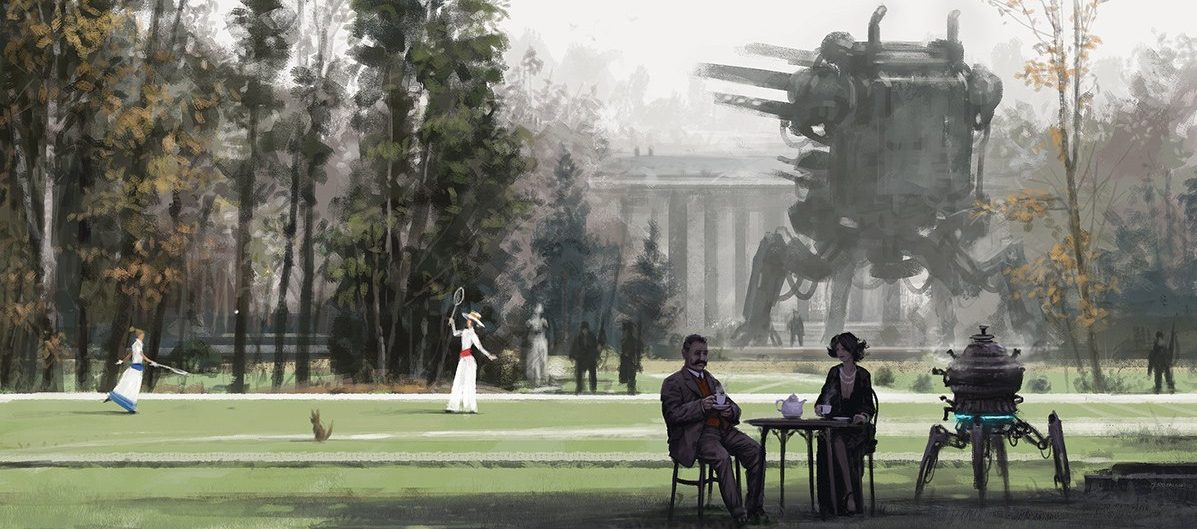
Category Archives: World Science Fiction
Microreading: Internalizing ‘Just’ Power in “I Kill Myself”
In Julian Kawalec’s short story “I Kill Myself”, an unnamed laboratory assistant decides to steal a bomb from his superior’s laboratory in order to detonate it without causing harm to others. He takes humanity’s life into his own hands by taking this bomb into his own literal hands. He slowly goes through a process of justification, starting with a simple view of his actions to a more perverted, glorified version of his initial intentions. This attempt to internalize power ultimately causes corruption and a God complex, which is often seen in leaders of war and political regimes. Kawalec pushes the reader to question what exactly makes an individual’s actions ‘just’.
At the start of the story, the narrator speaks of himself as an incredibly ordinary man, being a “homely-looking man in a gray raincoat, with big ears and a mole on the cheek” (Julian Kawalec p.260), and then later again as a “quiet sort and docile, with large ears and a mole on the cheek” (Kawalec p.262). The narrator’s emphasis on himself being so ordinary yet so driven to sacrifice himself for the good of others is Clausewitzian in the idea that anyone can become a soldier (Carl von Clausewitz, On War) to fight for their own beliefs. This recognition of normalcy allows the man to associate himself as being a part of a larger whole, both in being one of many who would sacrifice themselves if it is for the good of the people as well as being a part of nature. The narrator will “destroy the Zeta bomb. [He] shall do it for the sake of the trees, the animals, the birds, the people, the insects. [He] shall do it for his own sake” (Kawalec p.261). In order to save himself, he must save his surroundings.
Although the narrator still believes himself to be a part of something bigger than himself, he feels an “enormous and oppressive loneliness…great sacrifice demands great loneliness. If I talk about it, I’m sharing it with others, reducing its greatness”(Kawalec p. 261). This moment insinuates the moment when the narrator slowly begins to slip into the belief that this sacrifice is something only he can accomplish. He is no longer truly an ordinary being, for he now has a specific purpose in order to protect the world from destruction. At this point in the story, he is not yet corrupt to the point of selfishness, as we can see him determined to dodge detonation to deter destruction. In order to secure the bomb into his possession, the narrator passes through the guarded areas with ease as still a relatively ordinary man, but one with great capability due to his position as one of the senior lab assistants. Again, he is not ordinary for he is one of the few individuals capable of tactically pulling off this task.
After sharing his strategy to the reader of throwing the bomb into a marsh, the narrator expresses his fear of being caught. The glorification of his potential capture includes the whole of the police force, the special military departments, and even the secret service. The narrator denies that the “sacrifice to which I have dedicated myself cares nothing for such things” (Kawalec p.263), but he has already shared his gaudy vision which exposes his contradiction. His cowardice action of hiding is justified by the narrator who states that “the people, for whom I am making this great sacrifice, will not defend me” (Kawalec p.263), further distancing himself from the general population. If he is caught, he states that he will not surrender but kill as many servicemen as he can before he dies in an act of “valiant resistance”. It seems as though he would be killing those he swore to protect in the name of selfish, purposeful, fulfillment. However, it is more likely that as the narrator comes closer to his own self-sacrifice, he must come to terms with death. In glorifying his actions, he is justifying his means to himself while still believing that his sacrifice will result in the survival of mankind.
As the narrator continues to walk through the forest with the bomb, the trees whisper to him, signifying that they are still equally part of nature. The bomb must be destroyed so that the trees can live. With only the trees to comfort him, the narrator asks if it is “possible that such a great deed…be accomplished in such great silence?” (Kawalec p.265). No longer is the man afraid of being caught, but on the contrary, he struggles with the fear of not being recognized for his sacrifice. The recognition would give him courage, the element that makes men great. The narrator is stepping into the door of greed, stating that “[his] courage, which should accompany [his] sacrifice, will not suffer either, for [he] shall threaten the police…because they’re in the service of those who produce the bomb, those [he] hates” (Kawalec p.265). The narrator now completely isolates himself from humanity, by hating a group of servicemen. His recognition as a hated man would be better than not being recognized or remembered at all. His hatred transforms into ideas of terrorism and the wish to cause fear in these unlawful men. Although he sees life and death as a balance in the beginning, at this point in the story, he must truly cope with the idea of possible death. Unable to do so, he flips his justification to use terror rather than annihilation to save both those around him and himself.
Following his use of terror due to the deep hatred in humanity which he had so recently been a part of, the narrator’s negative emotions rapidly cease as he realizes that “blind sacrifice made me regard [the bomb] only as the source of a great evil” (Kawalec p.266). Instead of using sheer terrorism, the narrator concludes that the bomb can instead be used as the ultimate device to sort good from evil. He is now the “supreme judge”. The “trees already know; they bow down to the ground…he alone is good” (Kawalec p.267). He is no longer a part of nature or mankind but above it. He relates himself to other powerful leaders such as Caesar, Napoleon, and Alexander the Great (Kawalec p.267) who also found power in judgement. When fighting terror and fear, it is possible to do so with hope and faith. The narrator is now an entity between wicked and good. He is the ruler of ultimate faith, ultimate power, ultimate judgment. He is God. He can not be destroyed.
The black and white ideology of the narrator in the end, represents the simple mindset of domination. To become all-powerful, one can not empathize with others or see oneself as a part of nature, as an ordinary being like those around them. The narrator’s journey to ultimate corruption may seem frightening due to its domineering nature but originally came from good means and just intentions. The narrator’s ultimate goal was always to help humanity however selfish the way of doing so may be. People are selfish by nature and only feel sufficed when their purpose is fulfilled. This does not matter whether one is ordinary or all-powerful. The reader may see the narrator as truly unjust and selfish, but at its base, the story “I Kill Myself” depicts the narrator’s journey of fulfillment through his own, self-dignified, justified means.
